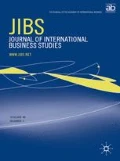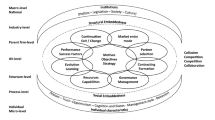Abstract
We assess Stephen Hymer's contribution to the theory of the multinational enterprise and to international business (IB) scholarship. We focus on Hymer's evolving analytical framework, and assess it in terms of its internal consistency and in the light of the shifting global landscape and scholarly thinking. We also extend Hymer's framework, revisit his predictions, and conclude by questioning his canonical status within the IB profession.
Similar content being viewed by others
References
Bain, J. S. 1956. Barriers to new competition: Their character and consequences for manufacturing industries. Boston, MA: Harvard University Press.
Barney, J. B. 1991. Firm resources and sustained competitive advantage. Journal of Management, 17 (1): 99–120.
Boddewyn, J. J., & Brewer, T. L. 1994. International-business political behavior: New theoretical directions. Academy of Management Review, 19 (1): 119–143.
Buckley, P. J., & Casson, M. C. 1976. The future of the multinational enterprise. London: Macmillan.
Cantwell, J., & Narula, R. (Eds) 2003. International business and the eclectic paradigm: Developing the OLI framework. London and New York: Routledge.
Casson, M. (Ed) 1990. Multinational corporations. London: Edward Elgar.
Chandler, A. D. 1962. Strategy and structure: Chapters in the history of the industrial enterprise. Cambridge, MA: MIT Press.
Chandler, A. D., & Redlich, F. 1961. Recent developments in American business administration and their conceptualisation. Business History Review, 35 (1): 1–27.
Coase, R. 1937. The nature of the firm. Economica, 16 (4): 386–405.
Cohen, R. B., Felton, N., Morley, N., & van Liere, J. (Eds) 1979. The multinational corporation: A radical approach: Papers by Stephen Herbert Hymer. Cambridge: Cambridge University Press.
Contractor, F. J., & Lorange, P. (Eds) 2002. Cooperative strategies and alliances. Oxford: Elsevier Science.
Contributions to Political Economy 2002. Stephen Hymer and the multinational corporation. Contributions to Political Economy, 21 (Special Issue): 1–134.
Dunning, J. H. 1958. American investment in British manufacturing industry. London: Allen & Unwin.
Dunning, J. H. 1997. Alliance capitalism and global business. London and New York: Routledge.
Dunning, J. H. 2006. Towards a new paradigm of development: Implications for the determinants of international business activity. Transnational Corporations, 15 (1): 173–228.
Dunning, J. H., & Lundan, S. M. 2007. The MNE as a creator, fashioner and respondent to institutional change. Mimeo, University of Rutgers and University of Maastricht.
Dunning, J. H., & Rugman, A. 1985. The influence of Hymer's dissertation of the theory of foreign direct investment. The American Economic Review, 75 (2): 228–239.
Eden, L. 1991. Bringing the firm back in: Multinationals in international political economy. Millennium: Journal of International Studies, 20 (2): 197–224.
Enright, M. J. 2000. Globalization, regionalization and the knowledge based economy in Hong Kong. In J. H. Dunning (Ed.) Regions, globalization and the knowledge based economy: 381–406. Oxford: Oxford University Press.
Enright, M. J. 2003. Regional clusters: what we know and what we should know. In J. Brϕcker, D. Dohser, and R. Soltwedel (Eds) Innovation clusters and interregional competition: 99–129. New York: Springer.
Foss, N. J., & Pedersen, T. 2004. Organising knowledge processes in the multinational corporation: An introduction. Journal of International Business Studies, 35 (5): 340–349.
Graham, E. M. 1990. Exchange of threats between multinational firms as an infinitely repealed non cooperative game. International Trade Journal, 4 (3): 259–277.
Hayek, F. A. 1945. The use of knowledge in society. The American Economic Review, 35 (4): 519–530.
Hill, W. L. 2006. International business (6th ed.). London: McGraw-Hill.
Hymer, S. H. 1960/1976. The international operations of national firms: A study of direct foreign investment. Cambridge, MA: MIT Press.
Hymer, S. H. 1968. The large multinational “corporation”. In M. Casson (Ed.) Multinational corporations: 6–31. London: Edward Elgar.
Hymer, S. H. 1970a. The efficiency (contradictions) of multinational corporations. The American Economic Review: Papers and Proceedings, 60 (2): 441–448.
Hymer, S. H. 1970b. The multinational corporation and the law of uneven development. In J. N. Bhagwati (Ed.) Economics and world order: 113–140. London: Macmillan.
Hymer, S. H., & Resnick, S. 1969. A model of an agrarian economy with non agricultural activities. The American Economic Review, 59 (4): 493–506.
International Business Review 2006. Special Issue: Stephen Hymer and International Business Strategy. International Business Review, 15 (2): 103–193.
Kindleberger, C. P. 1984. Plus ça change – A look at the new literature. In C. P. Kindleberger (Ed.) Multinational excursions: 180–188. Cambridge, MA: MIT Press.
Kindleberger, C. P. 2002. Stephen Hymer and the multinational corporation. Contributions to Political Economy, 21 (Special Issue): 5–7.
Kogut, B., & Zander, U. 1993. Knowledge of the firm and the evolutionary theory of the multinational corporation. Journal of International Business Studies, 24 (4): 625–645.
Lall, S. 2001. Competitiveness, technology and skills. London: Edward Elgar.
Lange, O. 1936. On the economic theory of socialism. The Review of Economic Studies, 4 (1): 53–71.
Madhok, A., & Phene, A. 2001. The co-evolutional advantage: Strategic management theory and the eclectic paradigm. International Journal of the Economics of Business, 8 (2): 243–256.
Mahoney, J. T., & Pandian, J. R. 1992. The resource-based view within the conversation of strategic management. Strategic Management Journal, 13 (5): 363–380.
McManus, J. C. 1972. The theory of the multinational firm. In G. Paquet (Ed.) The multinational firm and the nation state: 66–93. Toronto: Collier-Macmillan.
Penrose, E. T. 1959/1995. The theory of the growth of the firm (3rd ed.). Oxford: Oxford University Press.
Peteraf, M. A. 1993. The cornerstones of competitive advantage: A resource based view. Strategic Management Journal, 14 (3): 479–488.
Pitelis, C. N. 1991. Market and non-market hierarchies: Theory of institutional failure. Oxford: Blackwell Publishing.
Pitelis, C. N. 1994. Industrial strategy: For Britain, in Europe and the world. Journal of Economic Studies, 21 (5): 2–92.
Pitelis, C. N. 2000. A theory of the (growth of the) transnational firm: A Penrosean perspective. Contributions to Political Economy, 19 (1): 71–89.
Pitelis, C. N. 2002. Stephen Hymer: Life and the political economy of multinational corporate capital. Contributions to Political Economy, 21 (Special Issue): 9–26.
Pitelis, C. N. 2004a. (Corporate) governance, (shareholder) value and (sustainable) economic performance. Corporate Governance: An International Review, 12 (2): 210–223.
Pitelis, C. N. 2004b. Edith Penrose and the resource-based view of (international) business strategy. International Business Review, 13 (4): 523–532.
Pitelis, C. N. 2006. Capturing value from advantages, Mimeo, University of Cambridge.
Pitelis, C. N. 2007. Edith Penrose and a learning-based perspective on the MNE and the OLI. Management International Review, 47 (2): 207–219.
Porter, M. E. 1990. The competitive advantage of nations. New York: Free Press.
Ramamurti, R. 2004. Developing countries and MNEs: Extending and enriching the research agenda. Journal of International Business Studies, 35 (4): 277–283.
Richardson, G. 1972. The organisation of industry. Economic Journal, 82 (326): 883–896.
Rugman, A. M., & Verbeke, A. 2002. Location, competitiveness and the multinational enterprise. In A. M. Rugman & T.L. Brewer (Eds) The Oxford handbook of international business: 150–180. Oxford: Oxford University Press.
Sala-i-Martin, X. 2006. The world distribution of income: Falling poverty and… convergence, period. The Quarterly Journal of Economics, 121 (2): 351–398.
Scherer, F. M., & Ross, D. 1990. Industrial market structure and economic performance. Boston, MA: Houghton and Mifflin Company.
Schuler, D. A., Eden, L., & Lenway, S. 2006. Multinational corporations through the uneven development lens. In S. Jain & S. Vachani (Eds) Multinational corporations and global poverty reduction. Cheltenham: Edward Elgar, pp: 301–319.
Schumpeter, J. A. 1942. Capitalism, socialism and democracy. New York: Harper & Row.
Simon, H. A. 1995. Organisations and markets. Journal of Public Administration Research and Theory (Transaction), 5 (3): 273–295.
Solow, R. M. 1956. A contribution to the theory of economic growth. Quarterly Journal of Economics, 70 (1): 65–95.
Stigler, G. J. 1964. A theory of oligopoly. Journal of Political Economy, 72 (1): 44–61.
Stiglitz, J. 2002. Globalization and its discontents. London: Allen Lane.
Teece, D. J. 1982. Towards an economic theory of the multiproduct firm. Journal of Economic Behavior and Organization, 3 (1): 39–63.
Teece, D. J. 1985. Multinational enterprise, internal governance and industrial organization. The American Economic Review, 75 (2): 233–238.
Teece, D. J. 2006. Reflections on the Hymer thesis and the multinational enterprise. International Business Review, 15 (2): 124–139.
UNCTAD 2003. World investment report: Policies for development: National and international perspectives. New York and Geneva: United Nations.
UNCTAD 2005. World investment report: Transnational corporations and the internationalization of R&D. New York and Geneva: United Nations.
UNCTAD 2006. World investment report: FDI from developing and transition economies: implications for development. New York and Geneva: United Nations.
Williamson, O. E. 1981. The modern corporation: Origins, evolution, attributes. Journal of Economic Literature, 19 (4): 1537–1569.
Acknowledgements
An earlier version of this paper was presented at the 2003 European International Business Association (EIBA) conference in Copenhagen. Some of the ideas were also presented at the AIB meeting in Stockholm in July 2004. We are grateful to participants for their comments and discussion, especially Alan Rugman. The comments of Neil Kay, Roger Sugden, four anonymous referees of EIBA and AIB and four anonymous referees of this journal and the comments of Senior Editor Lorraine Eden are gratefully acknowledged. All errors are ours.
Author information
Authors and Affiliations
Corresponding author
Additional information
Accepted by Arie Y Lewin, Editor-in-Chief, 24 June 2007. This paper has been with the authors for two revisions.
Rights and permissions
About this article
Cite this article
Dunning, J., Pitelis, C. Stephen Hymer's contribution to international business scholarship: an assessment and extension. J Int Bus Stud 39, 167–176 (2008). https://doi.org/10.1057/palgrave.jibs.8400328
Received:
Revised:
Accepted:
Published:
Issue Date:
DOI: https://doi.org/10.1057/palgrave.jibs.8400328




